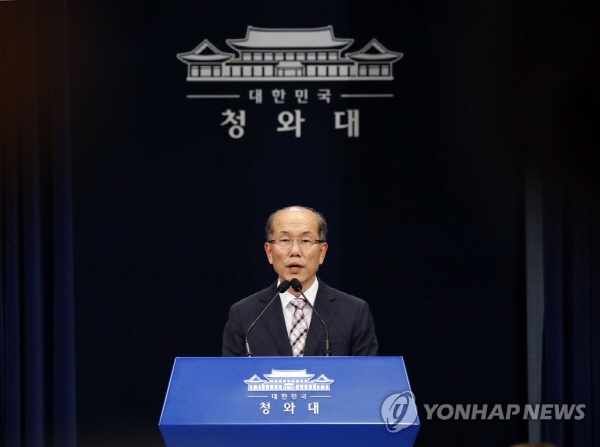South Korea said Thursday it has decided not to extend a bilateral agreement with Japan on exchanging classified military information in its strongest reaction yet to Japan's export restrictions.
Making public the decision, Cheong Wa Dae cited a "grave change" in security cooperation conditions and Tokyo's refusal to accept Seoul's repeated dialogue overtures.
Seoul plans to inform Tokyo of the measure before the Aug. 24 deadline via a diplomatic channel, according to Kim You-geun, deputy director of South Korea's presidential National Security Office.

The government concluded that it does not meet the national interest to maintain the General Security of Military Information Agreement (GSOMIA), which was signed for the purpose of sharing "sensitive military information," he said in a statement.
He pointed out that Japan had dropped South Korea from its whitelist of trusted trade partners "without providing clear ground" for the move, which has led to a "grave change in security cooperation circumstances between the two nations."
Japan only talked about a "problem" in terms of national security, he pointed out.
The surprise announcement followed a weekly meeting of the National Security Council's standing committee.
Moon endorsed the decision after having an hourlong discussion with its members, another Cheong Wa Dae official told reporters later on background.
Seoul's move is expected to deal a blow to trilateral security partnerships also involving the United States in Northeast Asia.
The Seoul-Washington alliance will, however, remain intact, and the termination of the pact does not mean the collapse of three-way security cooperation, the official emphasized.
He said South Korea has told the U.S. that it's "inevitable" to terminate the GSOMIA if Tokyo refuses to budge on its export curbs.
"Accordingly, the U.S. understands our government's decision this time," he added.
The GSOMIA, signed in November 2016, is aimed at streamlining intelligence sharing between the allies of the U.S. It has enabled Seoul and Tokyo to share information mainly on North Korea relatively quickly. It had been automatically renewed as neither side had sought to jettison it within a three-month prior notice period.
With Seoul's decision, however, such information will be shared through the U.S. as done before the introduction of the GSOMIA.
"The government decided not to extend the GSOMIA after a close review of various aspects," the official said.
Until the end of July, South Korea intended to extend the GSOMIA for another year, but Japan took the step on Aug. 2 to delist South Korea.
Moon has publicly warned that Japan would be fully responsible for consequences.
But the president used his Aug. 15 Liberation Day Speech to extend an olive branch to Japan, saying, "If Japan chooses the path of dialogue and cooperation, we will gladly join hands."
In spite of the "meaningful" message, Japan has been unresponsive, the Cheong Wa Dae official said.
The two sides failed to produce a breakthrough in their foreign ministerial talks held in Beijing on Wednesday, as Tokyo indicated no shift in its attitude.
Later on Thursday, Japanese Foreign Minister Taro Kono summoned South Korea's Ambassador Nam Gwan-pyo and lodged a formal complaint, calling Seoul's move very regretful. The unconventional late-night summons is seen as Japan's calculated move to convey displeasure at the latest actions taken by Seoul.
Japan's top diplomat also summoned Nam on July 19 and "rudely" protested Seoul's rejection of an arbitration panel to resolve the wartime forced labor issues.

